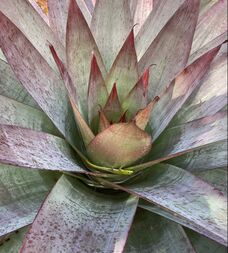 The Hynson (https://hynsonlab.com/) and Medeiros (http://www.medeiros-hui.com/) laboratories at the University of Hawai‘i at Mānoa are seeking two highly motivated post-doctoral researchers to work on a National Science Foundation-funded study entitled “MIM: Using Machine Learning and a Model Watershed to Understand how Microbes Govern Food Web Architecture and Efficiency”. A synopsis of this project can be found below. We are looking for applicants with expertise in one or more of the listed areas: • Aquatic food web ecology with experience setting up manipulative experiments • Fungal biology/ecology including field and/or lab-based studies • Microbial ecology, with experience generating and analyzing high throughput amplicon sequencing data. Potential projects will be developed in collaboration with the incumbent postdoctoral researchers, but could include manipulative and observational experimental designs to understand how: 1) microbiomes organize among trophic levels, and 2) how the structure and composition of the microbiome impact food chain efficiency and food web complexity. The projects will focus on the relatively simple aquatic food webs that occur in water-filled axials of terrestrial, tank bromeliads on O‘ahu, Hawai‘i. Researchers will be expected to employ appropriate molecular tools and advanced statistical methods to resolve the diversity of host-associated and free-living microbiomes, and how it relates to trophic interactions. Minimum qualifications include: • A PhD in Biology, Ecology or a related scientific discipline. • Research experience in one or more of the following fields: food web ecology, microbiome science, microbial ecology, fungal biology. • Evidence of scientific productivity in the form of peer-reviewed publications. • Strong science writing and communication skills. • Ability to work independently as well as a productive member of a team, including mentoring experience. The postdocs will be expected to carry out a portion of the work outlined in NSF-Rules of Life project, but will also have the option of developing studies within their specific areas of interest as they relate to microbiome studies. This includes potential collaborations with the Center for Microbiome Analysis through Island Knowledge and Investigation (C-M IKI; https://www.c-maiki.org/). Pay is commensurate with experience, start date is somewhat flexible, and appointment is for one year with the possibility to extend for an additional 1-2 years provided acceptable progress. Interested parties should email the following to Matthew Medeiros ([email protected]) and Nicole Hynson ([email protected]) • A brief cover letter outlining your background relevant to the project and how you meet the minimum qualifications. • A current CV with a list of 3 potential references and their contact info. Project Synopsis: Rules that govern food web dynamics, which describe how energy is transferred among different living organisms, are among the most universal laws of nature. Consumption up a food-chain is an inherently inefficient process that leads to significant and predictable losses through waste and respiration. This rule of life can be leveraged to model how biological diversity will respond to phenomena such as sudden changes in the environment or species extinctions, and is an important constraint in food production. Until now, food web research has largely focused on the interactions among plants and animals, however, microbes living in and on larger organisms play essential roles in their health, rates of reproduction, and ability to digest food. This project will examine how symbiotic microbes govern the efficiency of food webs, and how aspects of food webs, in turn, determine the composition of symbiotic microbes. The predictive insight gained from this research may make it possible to manipulate the composition of microbes to create more efficient food webs that can potentially guide restoration of degraded habitats, capture carbon, and increase yield in agriculture, aquaculture and biofuels systems. In addition, workforce development and outreach to under-represented groups including native Hawaiians and Pacific Islanders, will be performed. Postdoctoral researchers, graduate students and undergraduates will be trained in microbiome science through research experiences and class modules. This project addresses the hypothesis that canonical laws governing the transfer of energy among trophic levels of food webs both constrain, and are constrained by the composition and function of microbiomes. Leveraging a model Hawaiian watershed system, this project aims to understand how host-associated microbiomes govern food chain efficiency and how, in turn, trophic position within a food web affects the microbiome. The project will develop transfer learning approaches based on machine-learning tools trained on higher-feature datasets (such as the Earth Microbiome Project) to enable robust predictions of the interaction between food chain length, trophic position and microbiome diversity. Two tractable experimental systems will be used to explore these predictions. The first is a simple four-tiered bromeliad food web mesocosm where the number and of trophic levels is controlled. The second consists of a three-tiered mosquito microcosm in which all microbial symbionts are isolated and manipulated. Associated genomic data will enable a mechanistic understanding of how microbiomes influence food web efficiency and function by altering metabolic capacity of hosts. In summary, this project will employ food web theory to explain and predict the interactions between the microbiome, the host, and the environment. The University of Hawaiʻi is an equal opportunity/affirmative action institution and is committed to a policy of nondiscrimination on the basis of race, sex, gender identity and expression, age, religion, color, national origin, ancestry, citizenship, disability, genetic information, marital status, breastfeeding, income assignment for child support, arrest and court record (except as permissible under State law), sexual orientation, domestic or sexual violence victim status, national guard absence, or status as a covered veteran.
0 Comments
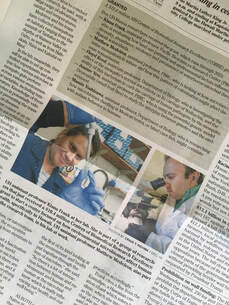 Our team of young University of Hawai‘i researchers interested in the environmental microbiome have received a $10.4 million Center for Biomedical Research Excellence grant from the National Institute of Health. Under the direction of senior investigators Margaret McFall-Ngai, Ned Ruby, and Marilyn Dunlap, junior investigators Kiana Frank, Floyd Reed, Joanne Yew, Masato Yoshizawa, and myself will investigate independent but overlapping projects that all explore how microbes mediate the link between the environment and human health. Our work will focus on the environmental and ecological forces that modulate the assembly of the mosquito microbiome. Big thanks to the Honolulu Star-Advertiser, Hawaii News Now, and KITV news for sharing our work. See the UH news release here.
REU Student discovers a new mosquito population behind Honolulu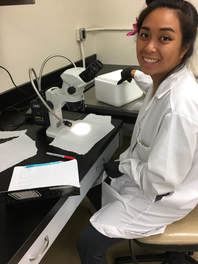 Rachelle Tom, a native Hawaiian from Pālolo, completed an REU internship in the lab. She surveyed the mosquito community in the Makīkī-Mānoa watershed with a variety of traps. During her field work, she discovered a breeding population of Aedes japonicus in the upper elevations of the watershed. This places a globally invasive mosquito vector of public health importance in the mountains behind Honolulu, Hawai‘i's largest city. Her work highlights the capacity of these mosquitoes to spread to new environments and underscores the necessity for more active mosquito surveillance in Hawai‘i. Rachelle will start as a graduate student in NREM at UH-Mānoa soon. Way to go, Rachelle! REU for Pacific Islanders in Environmental Biology CommencesAlong with Michael Hadfield, Matt is coordinating our NSF-funded Research Experiences for Undergraduates (REU) Program in Environmental Biology. Our 2017 cohort consists of 12 Native Hawaiian and Micronesian undergraduate students from O‘ahu, Saipan, Guam, Palau, Pohnpei, and the Marshall Islands. These students are now actively pursuing a diversity of research topics across several different units at the University of Hawai‘i at Mānoa, including the Pacific Biosciences Research Center, the Hawai‘i Institute for Marine Biology, the Department of Biology, and the Department of Botany.
Summary Statement of the "Mosquitoes in Hawai‘i" Workshop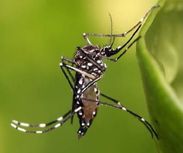 Here is the link to a summary report of the Mosquitoes in Hawai‘i Workshop convened in September 2016 in Volcano, Hawai‘i. Matt participated in this event along with several other national and international experts on mosquito biology and mosquito-borne infectious disease. The conference was supported and funded by Hawai‘i County and the Hawai‘i Exemplary State Foundation. The ultimate goals of this effort are highly ambitious, but critical for the conservation of native Hawaiian avifauna and the mitigation of important public health threats to the State of Hawai‘i. www.cpc-foundation.org/uploads/7/6/2/6/76260637/report_on_mosquito_free_workshop.pdf Small-mammal borne zoonotic disease in Hawai‘i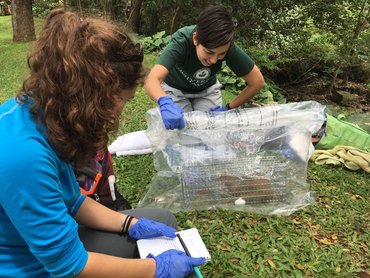 Dr. Amber Wright (center) and research technician Arielle Crews process a small Asian mongoose in conjunction with Dr. Wright's Hawaii Community Foundation funded study on Leptospirosis transmission ecology in Mānoa. Dr. Amber Wright (UHM Biology), Dr. Robert Cowie (UHM PBRC), and Matt are launching a new line of research in Hawai‘i on the transmission ecology of zoonotic pathogens that utilize small mammals as reservoir hosts. This line of research will include interrogating the patterns of multiparasitism in Rattus hosts and understanding how interactions between coinfecting pathogens within hosts may scale to influence transmission between hosts. In addition, other related projects will investigate host specificity and transmission dynamics among strains of Leptospira across rats, mice, mongoose, and other mammals, as well as the spatiotemporal variation in the risk of zoonoses associated with small mammal reservoirs in Hawai‘i. Recently, Amber, Matt, researcher Arielle Crews, and UH veterinarian Mike Wong conducted the field sampling protocol on some mongooses that we caught around Mānoa Stream.
Aloha! The first wave of publications (6 in all) from the lab are out. These include a study that links red imported fire ants to tick-borne disease, several papers on the avian malaria system including the discovery of a new clade at the potential rank of genus in North American cranes, and a dispersal study of mosquito vectors in a suburban setting. Check them out in the publication section, or email Matt for reprints!
Aloha! Matt is now a cooperating faculty member of the entomology graduate program within CTARH at the University of Hawai‘i at Mānoa. This great news is timely as the lab has numerous pending and in prep grant applications that deal with mosquito vector biology and the mitigation of mosquito-borne infectious disease transmission. Students interested in questions associated with the insect microbiota, host-parasite interactions in insect systems, medical entomology, and mosquito biology should contact Matt to inquire about joining the lab and review the requirements to enter the M.S. or Ph.D. program in entomology.
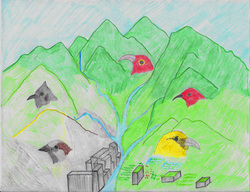 The Medeiros lab in the Pacific Biosciences Research Center at the University of Hawai‘i at Mānoa is now open! Our research will focus on the ecology and evolutionary biology of infectious disease using the biological systems of Hawai‘i. Beyond advancing science directly, our lab aims to facilitate the access of under-represented native Hawaiian students to STEM fields. We achieve this by adopting culturing informed methods of conducting science. In addition, much of our research has direct implications toward developing sustainable practices that mitigate the risk of infectious disease for human and wildlife populations in Hawai‘i nei, and in parallel, work to preserve Hawai‘i’s native biodiversity, environment, cultural practices and livelihoods. We are deeply committed to public engagement, and strive to bridge gaps between the scientific community and the public through citizen science campaigns. If you share our goals, please consider joining or collaborating with us. |
The Medeiros Hui
We are a group of scientists studying the ecology and evolutionary biology of infectious disease in Hawai‘i Archives
January 2022
Categories |
The Medeiros Hui
News
Proudly powered by Weebly
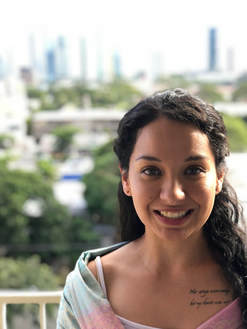
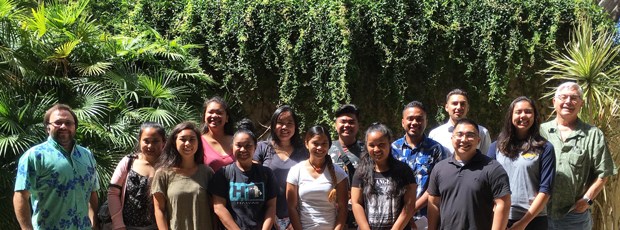
 RSS Feed
RSS Feed